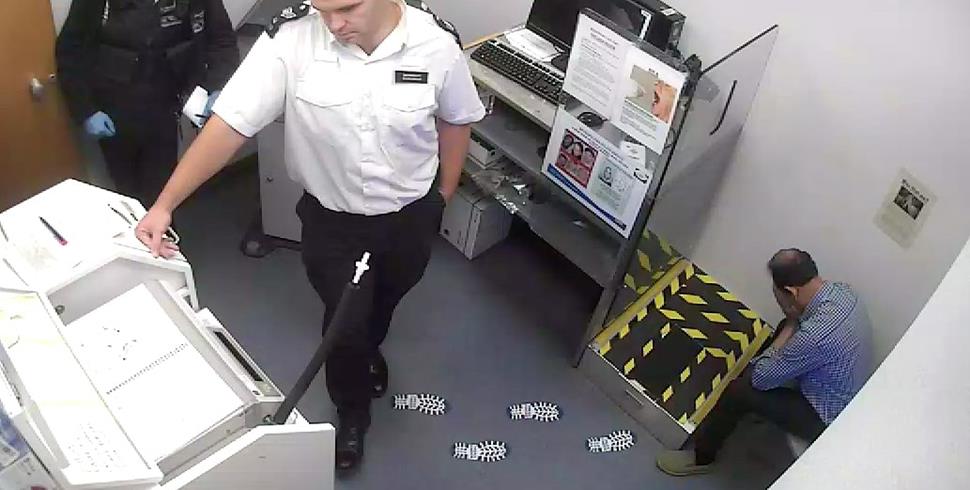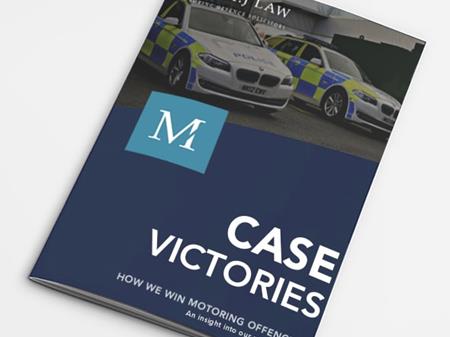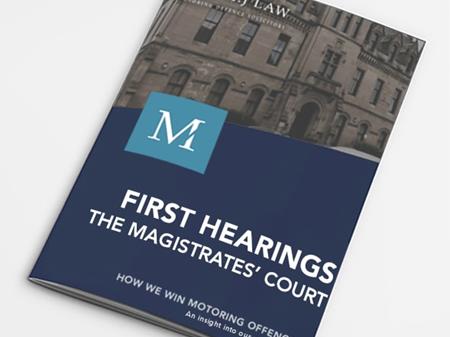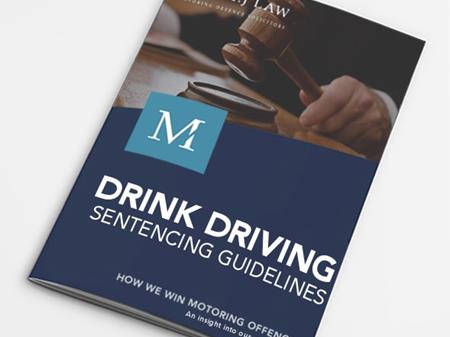
A failing to provide a specimen charge doesn't always mean a driving ban
Failing to provide a specimen is a serious offence which can often carry a mandatory prison sentence. If you are charged with the offence of failure to provide a specimen it is important you obtain specialist legal advice straight away. The offence often begins with someone being pulled over by the police. That person will then usually be asked to complete a roadside test before being arrested and taken into police custody. In police custody, the officer will ask for an evidential specimen of breath.
There are a number of different defences that apply to a failure to provide charge. Just because you did not provide a specimen does not mean you are guilty of failing to provide. This blog aims to explore the ways in which you can avoid a ban for failing to provide a specimen.
You may know by now that failing to provide carries a mandatory driving disqualification. This means that you will be banned if you are convicted of the offence. The minimum driving disqualification is 12 months, however in fail to provide cases, the average disqualification period can be around 18 months. The court can also impose a fine, community service or in the most serious cases, a custodial sentence.
'Reasonable excuse'
There is often a good reason why someone is unable to provide a specimen of breath whilst in police custody. See the below example which shows the wording of a fail to provide charge:


You are only guilty of failing to provide a specimen, if you do not have a reasonable excuse. The police will often decide to charge someone with failing to provide a specimen, but this does not mean that you are guilty, nor does it mean that you do not have a reasonable excuse defence to the allegation. There's no one definition of reasonable excuse, and it is often broadly defined. Common examples of a 'reasonable excuse' can be seen below:
- A physical injury
- A medical condition
- Asthma
- Chronic Obstructive Pulmonary Disease (COPD)
- Long COVID-19 (which has recently become more common)
- Mental health (panic attacks, anxiety and depression)
- Learning difficulties
Should you wish to rely on a reasonable excuse as a defence, you are only required to raise an 'evidential basis'. This may be some evidence which outlines a condition which may have prevented you from providing the sample in police custody. The prosecution service are then required to disprove that you do not have a reasonable excuse and that your condition would not have prevented you from giving the sample of breath.
A 'reasonable excuse' could be confirmed by documentary evidence, including;
- Statements from family members or friends
- Medical records and letters from your GP or doctor
- An expert report commenting on your condition and the effect it would have on your ability to provide a sample
If you think you might have a reasonable excuse defence, then it is important that you seek legal advice. It is important that you are told exactly what evidence you will need to produce in order to be successful in winning the case, based on a reasonable excuse argument.
Police Procedure
If you do not have a reasonable excuse, that's not to say that you do not have a defence to the allegation of fail to provide. The way in which you were processed both at the roadside and the police station is important in fail to provide cases. If the stop, arrest or the test at the roadside was unlawful, this can have an impact on the way in which the prosecution service deal with the case. They may decide to discontinue a fail to provide a specimen case if the arrest or stop was unlawful.
In the police station, there are really important procedures the police have to go through, whenever the police ask someone to provide a sample of breath. It's never as simple as an officer saying "will you give a sample of breath" and then you refuse. The police have to fill out an important 25 page procedural document known as the MGDDA form. This document is designed to guide the officer through the breath test procedure, and it also contains a long list of questions, as well as the necessary legal requirements and warnings that have to be given to you before you provide a sample in police custody.
If someone refuses to provide a sample in police custody, this can often confuse the police and they don't always know what steps to take, or how to react in that scenario. Most people who are taken to the police station for this reason will often comply, and provide a sample when an officer asks them to do so and of course, the police prefer that. But, if you refuse to provide a sample in police custody, the police can often believe (wrongly) that they then do not have to fill out all of the paperwork that is required. This is because the paperwork relates to breath samples, alcohol and how someone should blow into the breath test machine. This is where the police procedure can go wrong. So, if the procedure was not carried out correctly by the police, then that is a point on which you can challenge a fail to provide allegation.
The police are required to prove, beyond all reasonable doubt that they did carry out the procedure in the correct way. If it wasn't, it is usually case closed for the prosecution service. It is always worth while asking the prosecution service to provide things like body-worn video or CCTV from police custody. We can even ask for a copy of the MGDDA document. If this shows that the procedure was incorrect or was not completed, you would likely escape a conviction for fail to provide.
Attempts to provide a breath sample
If you were taken in to the breath test room and you made some attempts to blow into the machine, but the officer claims that you were not blowing hard enough, this may be the reason why you have been charged. In this scenario, it may give rise to a separate defence. This relates to the small mouth piece which is attached to the machine by the police officer operating the machine. These tubes have to be new and are packaged separately to ensure hygiene systems are followed in police custody.
If you were unable to provide a sample of breath, then you may be able to argue that the mouthpiece was blocked or defective in some way. The reason that this can help your case is because the police will often discard the mouthpiece, after you make attempts to blow in to the machine. Should you then raise this as a defence issue, the prosecution service do not have the mouthpiece (because it was discarded by the police) and they then cannot prove that the mouthpiece was not faulty, blocked or defective in some way.
In the video below, our senior solicitor Conor Johnstone identifies the different ways of challenging a fail to provide breath case
Failing To Provide Sentencing Guidelines
| Level of seriousness | Starting point | Range | Disqualification | Disqualification if 2nd offence within 10 years |
| Category 1 | 12 weeks' custody | High level community order - 26 weeks' custody | 29 - 36 months (extend if imposing immediate custody) | 36 - 60 months (extend if imposing immediate custody) |
| Category 2 | Medium level community order | Low level community order - High level community order | 17 - 28 months | 36 - 52 months |
| Category 3 | Band C fine | Band B fine - Low level community order | 12 - 16 months | 36 - 40 months |
If you have a previous drink or drug driving or failing to provide within the past 10 years the minimum disqualification is 3 years. The Drink Driving Rehabilitation Course will reduce the length of ban by 25%.
FAQ - Sentencing Guidelines
-
Can I pay a higher fine to avoid a ban?
No. The fine is means tested and depends upon your income. It is usually around 100-150% of your net-weekly income. If you plead guilty at the first opportunity you would receive maximum credit on the fine. Maximum credit is one-third. Credit does not apply to the length of the disqualification. -
I'm a carer for a family member. Will the court let me keep my licence?
No. There are no provisions allowing someone convicted of fail to provide to keep hold of their licence as a carer. Failure to provide has far reaching consequences and will no doubt affect the people close to you. The court cannot take this into account when sentencing. -
Will I go to prison?
Going to prison for drink driving is unlikely. Only in the most serious circumstances will a person receive a custodial sentence for drink driving. The odds are greater if a person has a relevant previous conviction or if there were serious aggravating factors.
How to get off a failure to provide charge
Defend the charge
Under Article 6 of the European Convention on Human Rights everyone has the right to a fair trial. Failure to provide cases take place in the Magistrates' Court. You can learn the difference between the criminal courts using the GOV.UK website. The prosecution process generally begins with the police making an arrest. Evidence is then gathered by the police to establish what actually happened and who was involved. In a failure to provide case case, evidence might include;
- A printout from the breath test machine (if attempts to provide were made)
- CCTV from the roadside / police custody
- Witness statements
- An MGDDA document
Once the appropriate evidence has been gathered, the police will decide whether it is sufficient to charge the suspect. In order to charge, the police must be satisfied that there is sufficient evidence to provide a realistic prospect of conviction against the suspect. Depending on the type and seriousness of the offence committed, this decision is made by the police or the Crown Prosecution Service (CPS). If a person is charged with failing to provide, they are usually released and bailed to attend the Magistrates' Court.
Prosecutors review every case they receive from the police or other investigators. Review is a continuing process and prosecutors must take account of any change in circumstances that occurs as the case develops. This includes what becomes known of the defence case, any further reasonable lines of inquiry that should be pursued, and receipt of any unused material that may undermine the prosecution case or assist the defence case, to the extent that charges should be altered or discontinued or the prosecution should not proceed. If a case is to be stopped, care should be taken when choosing the method of termination, as this can affect the victim’s position under the Victims' Right to Review scheme. Wherever possible, prosecutors should consult the investigator when considering changing the charges or stopping the case. Prosecutors and investigators work closely together, but the final responsibility for the decision whether or not a case should go ahead rests with the CPS. [CPS Code for Crown Prosecutors]
In almost all cases involving a failure to provide, the police will charge the suspect. A date will then be set for the suspect to attend court for a first appearance. If you have been given a date to attend court you will no doubt be extremely worried. We have produced a detailed booklet about first hearings in the Magistrates' Court. You can access this here.
There is nothing wrong with pleading not-guilty, even if you could not provide a sample. Every person has the right to challenge an allegation made by the police and to check the evidence against them. Not only can you continue to drive for 2 - 6 months, you will also see the full case file held by the CPS, including any witness statements and the MGDDA document. It is only by checking the evidence can you find fault with it.
Thinking of pleading guilty?
Our Case Studies take a look a real cases involving real people. You may also be interested in reading about court hearings in the Magistrates' Court and Sentencing Guidelines. You can also view our case studies page for more information.

A Summary of Recent Cases – Marcus A Johnstone
How to win the 'unwinnable' cases...

Drink Driving – Your First Court Hearing
This booklet discusses a drink driving first court hearing - Is a solicitor necessary?

Will you go to prison?
This booklet looks at the Magistrates' Court Sentencing Guidelines for drink driving
Prosecution Disclosure
If you read our blogs regularly you will know that we speak often about the affect of prosecution disclosure (or lack of) in criminal cases. Under the Criminal Procedure and Investigations Act 1988 the CPS have a duty to provide you with;
- The evidence is wants to use against you
- A schedule of unused material
This disclosure should be served as soon as possible following a not guilty plea in the Magistrates' Court and usually within 28 days of the first hearing. But what happens if the CPS fail to provide disclosure within the permitted timeframe?
A failure by the CPS to provide disclosure is one of the most common ways that we win failure to provide cases. This is because rules of evidence require the CPS to serve its evidence prior to trial. Often due to staff shortages and administration problems the CPS miss deadlines and make silly mistakes. This is a common occurrence in Magistrates' Court cases, usually because failure to provide cases are less serious than other offences in higher courts.
Unfortunately it's not as simple as sitting back and letting the CPS slip up. The defence are required to be proactive in contacting the CPS and in some circumstances are required to call the case back to court for a pretrial review. As an experienced team of specialist defence solicitors, we can advise you on all of these issues. We know how to best safeguard your position in order to give you the best chance of winning your failure to provide case.
Next Steps: Please get in touch to discuss your case with a member of our team. You can use the contact form below or call 01514228020 for free initial advice.



